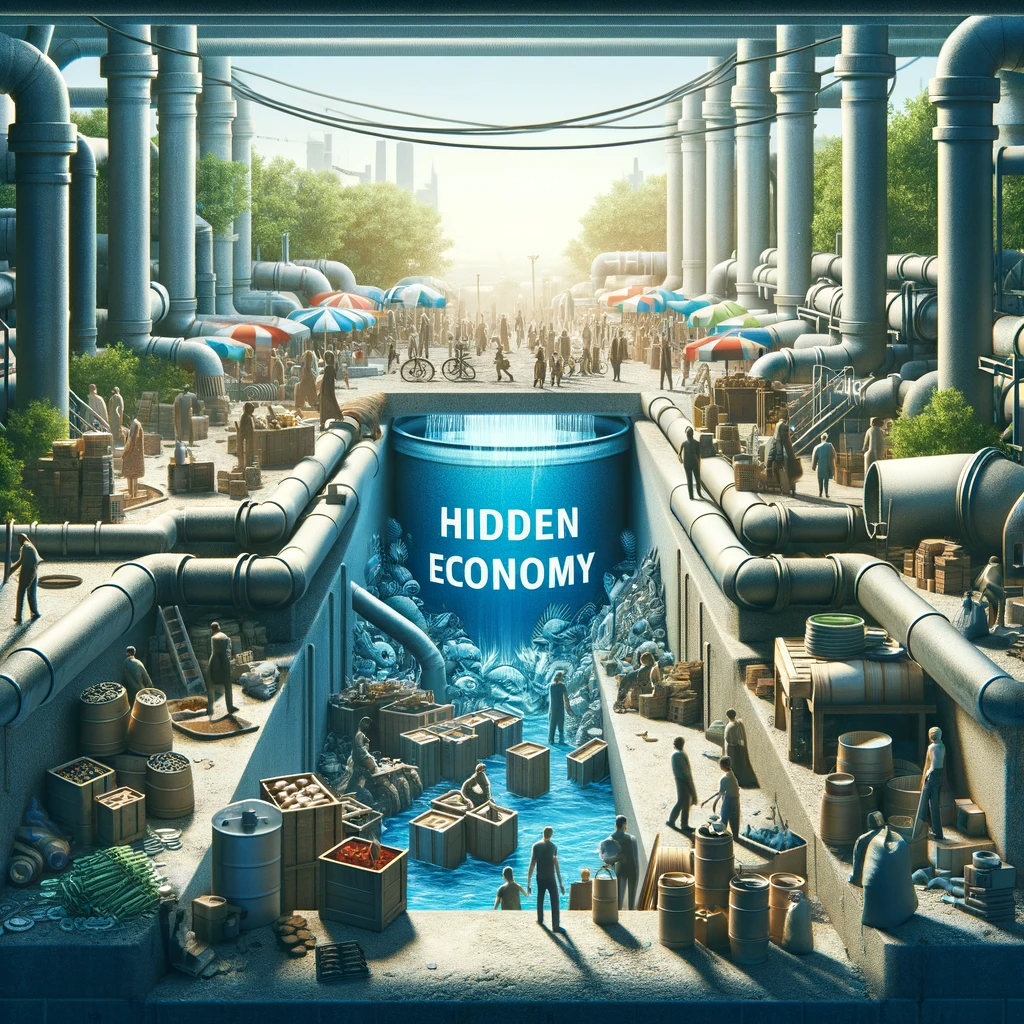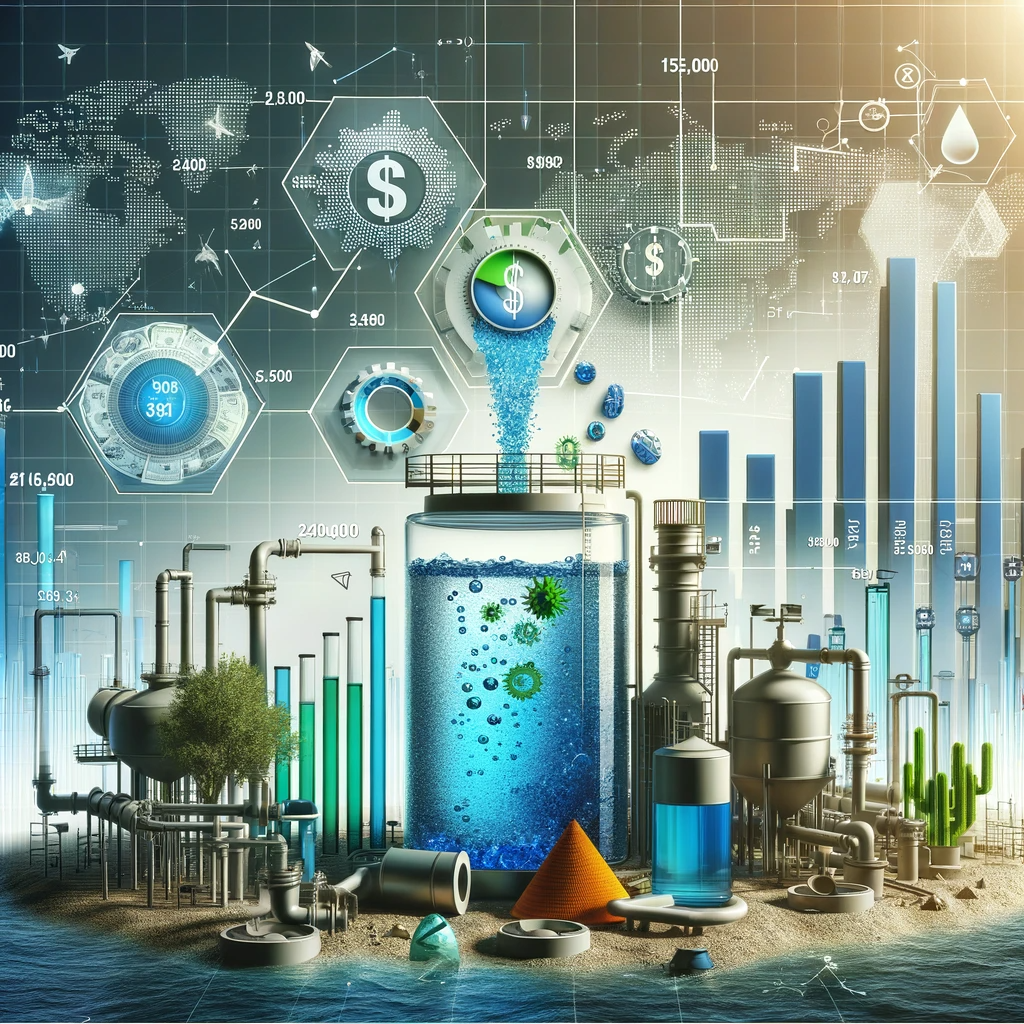The Hidden Economy: Waste Water Supply and Its Financial Impacts
Exploring the Hidden Economy
The Hidden Economy plays a crucial role in our world, and one area that deserves exploration is the linkage between waste water supply and its financial impacts. As water scarcity becomes a growing concern for economists, policymakers, and businesses, the implications of waste water supply become even more significant. In China, for example, where agriculture is the backbone of the economy and population lacks access to clean water, the issue of water scarcity poses a threat to the viability of family farms and the nation’s food industry. The situation is similar in other parts of the globe, where water shortages and the lack of sustainable water management systems impact the development and production of commodities. As the demand for water increases, the loss of water supplies has a direct impact on industries and the overall economy. Therefore, understanding the economic implications of waste water supply is crucial for policy-making and developing sustainable water management systems.

Understanding Its Basics
The understanding of the basics of the hidden economy, specifically in relation to waste water supply and its financial impacts, is crucial in addressing the challenges we face today. There is evidence that millions of lives are affected by the generation and replacement of waste water. The effects of complacency and reluctance to address the shortcomings in waste water systems can lead to emergency situations and maintenance issues. Grades for water quality, waterways, and drinking water treatment vary across Europe, highlighting the need for improved technologies and systems to ensure the well-being of communities. For example, water crisis incidents such as algal blooms and aquifer depletion have prompted the implementation of water recycling systems and seawater desalination plants. Recognition of the importance of sustainable water management and the development of laws and regulations for residents and industries is essential to avoid future water crises.
Significance and Scope in Modern World
The Hidden Economy: Waste Water Supply and Its Financial Impacts have become a significant and influential factor in the modern world. With increasing regulations and the escalating response to the environmental and health risks associated with waste water, cities such as Atlanta, Tampa, and Charlotte, as well as regions like North Carolina, are implementing new approaches to waste water management. From the treatment of waste water from food processing plants to the exploration of new economies driven by waste water, there is a growing realization of the scope and potential of this hidden economy. However, there are also challenges and threats to address, such as damage to infrastructure and the vulnerability of waste water systems to pollutants. It is crucial for agencies and policymakers to take a lead role in protecting our water resources and ensuring the sustainability of waste water supply.
The significance and scope of waste water supply in the modern world extend far beyond its immediate economic implications. The discovery of the link between waste water and the hidden economy has been a driving force in shaping policies and responses to water scarcity concerns. For example, in Oregon, the discharge of waste water into the sea has led to rising sea levels and contamination of the drinking water aquifer. Similarly, the utility of waste water for various purposes, such as irrigation and cleaning, has been a crucial part of the economic development of cities like Ohio. However, the use of waste water in agriculture and other industries also presents challenges, such as the potential for runoff and flooding, which can impact the surrounding ecosystems. It is essential for the scientific community, policymakers, and water management agencies to work together to address these challenges and find sustainable solutions for waste water supply.
Unveiling the Link between Waste Water and the Hidden Economy
The link between waste water and the hidden economy is a crucial aspect of waste management and wastewater management. This article aims to explore the financial impacts of waste water supply and its significance in the hidden economy. Waste water systems are a valuable source of water supply, providing substantial benefits for public health, the economy, and the environment. However, there is a lack of studies that can unfold the full potential of wastewater systems in terms of economic impacts. By understanding the scope and potential of waste water supply, we can unlock opportunities for investment and develop sustainable wastewater treatment technologies that can contribute to the hidden economy.
Role of Waste Water in the Hidden Economy
Waste water plays a crucial role in the hidden economy, specifically in terms of its supply and the financial impacts it can have. The Hidden Economy: Waste Water Supply and Its Financial Impacts are significant factors that contribute to the overall sustainability of the economy. By reducing water pollution and addressing water scarcity, waste water systems have the potential to provide substantial benefits for public health, the economy, and the environment. However, there is a lack of studies that can unfold the full potential of waste water in the hidden economy, highlighting the need for further research and implementation of sustainable waste water management systems.
The variability and heightened scarcity of water resources have made waste water treatment and reuse projects essential in addressing the water needs of communities. This has led to the implementation of various initiatives and technologies aimed at reducing water pollution and maximizing water reclamation and recycling. Despite the feasibility and potential benefits of such projects, there are implementation issues and challenges that need to be addressed to ensure the viability of waste water as a valuable resource in the hidden economy. It is important for researchers, policymakers, and stakeholders to collaborate and find innovative solutions to overcome these issues and fully harness the opportunities offered by waste water supply in the hidden economy.
Waste Water Processing: A Hidden Economic Activity
Waste water processing is a hidden economic activity that plays a crucial role in the hidden economy, especially in terms of waste water supply and its financial impacts. It is a source of substantial benefits for public health, the economy, and the environment. However, there is a lack of studies that can fully unfold the potential of wastewater systems in reducing water pollution, managing water variability, and addressing heightened scarcity. One example of a study conducted by de Koning et al. in Berlin, Germany, Heidelberg, Japan, Tokyo, Barcelona, Stockholm, X.C., Cardona, Grün, Mattas, Michailidis, H.F., Mocholi-Arce, Simeoni, Almeida, Ribeiro, Ivancev-Tumbas, Antakyali, Yost, Zairi, Pereira, Test, and Benefit-Cost Ratio is a comprehensive overview of the financial investments and growth potential of waste water processing. This study, published by MDPI and authored by a team of experts, provides insights into the economic implications and benefits of investing in waste water processing.
The Financial Impacts of Waste Water Supply
Waste water supply has significant financial impacts on the hidden economy. Efficient waste-stream practices and proper disposition practices are crucial for minimizing the financial burden associated with waste water flows. The financial impacts of waste water supply encompass a wide range of factors, including the ghg emissions footprint, mass flows, and cost implications. Mitigation strategies, such as climate change mitigation strategies, present opportunities for reducing the financial costs of waste water supply while also meeting natural resource demands. Studies have shown that implementing strategies for waste water management can lead to cost savings for both individuals and governments. Additionally, waste water can be treated as a commodity, with potential for sale and revenue generation. However, it is essential for government action and household-level efforts to align in order to fully realize the economic benefits of waste water supply. By implementing efficient waste water management practices, the economy can benefit from cost savings, revenue generation, and reduced environmental impacts.
Revenue Generation through Waste Water Supply
Waste water supply plays a crucial role in revenue generation within the hidden economy. Companies like Coca-Cola rely heavily on waste water as a key input in their production processes. Through various recycling and waste management initiatives, these companies are able to minimize costs and maximize profits. Sensitivity analysis is conducted to assess the impact of different factors such as composition, transport distances, and disposal fees on revenue generation. By optimizing recycling processes and making strategic input changes, waste water supply can become a valuable commodity, bringing economic benefits and reducing the strain on natural resources.
The financial impacts of waste water supply are significant in terms of revenue generation. A life-cycle impact assessment method is often used to calculate the economic benefits derived from waste water recycling. This method considers factors such as the amount of waste generated, electricity usage, greenhouse gas emissions, and material recovery. By analyzing different scenarios and assumptions, it is possible to estimate the financial gains from waste water supply. Additionally, the integration of recycling programs and the development of sustainable waste management systems further contribute to revenue generation. By considering factors such as market restrictions, recycling rates, contamination rates, and the cost of recycling processes, companies can optimize their operations and maximize the economic benefits derived from waste water supply.
Cost Implications in the Waste Water Sector
The cost implications in the waste water sector are significant and varied. The hidden economy of waste water supply and its financial impacts can be seen in various ways. For instance, in Colorado, there are mandates that require a certain percentage of waste water to be treated before it can be discharged. The quantities and types of waste water can vary depending on the number and types of households in a given area. The steps involved in waste water processing, such as collection and treatment, incur material, labor, and capital costs. Additionally, waste water treatment plants have to bear costs related to maintenance, energy consumption, and disposal. These costs can add up to a substantial amount, impacting the overall economy and environmental sustainability.
In order to manage waste water costs effectively, it is important to consider various factors. A study conducted in Canada, specifically in Ontario, found that different types of waste water treatment processes have different cost implications. Capital costs for infrastructure, collection costs for waste water, and vehicle fuel costs for transportation can vary depending on the nature of waste water flows. The study also highlighted the importance of considering life cycle assessment studies in waste water management, as they provide insights into the overall costs associated with waste water treatment and disposal. By understanding the cost implications and prioritizing cost-effective solutions, the waste water sector can contribute to the sustainable growth of the economy while mitigating the impacts of climate change.
Sustainability and the Hidden Economy; The Waste Water Angle
Sustainability plays a crucial role in waste water management, particularly in the context of the hidden economy. Waste water supply and its financial impacts are significant factors to consider when evaluating the sustainability of waste water systems. The Act’s grants to municipal wastewater treatment plants are an important source of funding for these systems. However, there is a lack of studies that can unfold the full potential of waste water supply in terms of reducing water pollution, addressing variability, and responding to heightened scarcity. By exploring and understanding the hidden economy associated with waste water, substantial benefits can be realized for public health, the economy, and the environment.
The Role of Sustainability in Waste Water Management
The Role of Sustainability in Waste Water Management encompasses various key aspects of The Hidden Economy: Waste Water Supply and Its Financial Impacts. It highlights the need for reducing water pollution, managing variability, and addressing heightened scarcity. By doing so, substantial benefits can be achieved for public health, the economy, and the environment. However, there is a lack of studies that can provide a comprehensive understanding of wastewater systems and their impact on water supply. This gap in knowledge calls for further research and analysis to unlock the potential of sustainable waste water management.
The Act’s grants to municipal wastewater treatment plants play a crucial role in promoting sustainability. These grants provide the necessary funding to improve waste water treatment processes and reduce pollution. However, there is limited data and analysis on the effectiveness and cost-effectiveness of these grants. It is important to conduct studies and gather data sets to assess the consequences of these grants and their overall impact on water quality. Such research will provide valuable insights and help inform policymakers and stakeholders about the best approaches to ensure sustainable waste water management.
Green Initiatives in the Waste Water Industry and Economic Implications
Green initiatives in the waste water industry have significant economic implications for the hidden economy, particularly in terms of reducing water pollution and variability. These initiatives have been found to have substantial benefits for public health, the economy, and the environment. By investing in wastewater systems and improving the source water supply, these initiatives contribute to the reduction of water pollution and ensure a more reliable and sustainable water resource. For example, the Clean Water Act’s grants to municipal wastewater treatment plants have played a crucial role in improving water quality and encouraging environmentally-friendly practices. However, there is still a lack of comprehensive studies that can fully unfold the economic potential and benefits of these green initiatives.
One of the main challenges in quantifying the economic impacts of green initiatives in the waste water industry is the complex research design required. Researchers like Freeman and Shapiro have conducted studies using various models to estimate the economic contributions of these initiatives. They have investigated factors such as project costs, the use of the Freedom of Information Act requests to gather data, and the economic implications of reducing pollution levels. For example, in the Cuyahoga River example, the magnitude of pollution declines as pollution permits and laws are implemented. Through econometric regressions, researchers have examined the welfare implications of these initiatives and their effect on economic outcomes. Additionally, textbooks have listed various research designs and methods, including travel cost methods, to capture the economic impact of these green initiatives in the waste water industry.
Scrutinizing the Economic Models Surrounding Waste Water Supply
Scrutinizing the economic models surrounding waste water supply is crucial in understanding the hidden economy and its financial impacts. The hidden economy refers to the contribution of waste water systems to economic growth and development. By reducing water pollution, waste water systems bring substantial benefits for public health, the economy, and the environment. However, there is a lack of studies that can unfold the full potential of waste water systems as an economic driver. The Act’s grants to municipal wastewater treatment plants have been instrumental in improving the infrastructure and technology of waste water systems. Analyzing the intricacies of waste water supply models, such as the use of point estimates, tracts, and domain, can provide valuable insights for project conception and addressing concerns related to background concentration of pollutants, abatement technology, and treatment costs. Additionally, understanding the economic implications of waste water supply, including maintenance costs, operating costs, and compliance with state standards, is essential for ensuring the sustainability and effectiveness of these systems.
Waste Water as a Commodity
Waste water has emerged as a commodity within the hidden economy, with significant implications for both supply and its financial impacts. The treatment and management of waste water have become crucial in reducing water pollution and addressing the issue of variability and heightened scarcity. Proper treatment of waste water not only provides substantial benefits for public health, the economy, and the environment, but it also contributes to the overall sustainability of water systems. However, despite the importance of waste water as a commodity, there is still a lack of comprehensive studies that can unfold its full potential and the economic benefits it can bring.
The Hidden Economy: Waste Water Supply and Its Financial Impacts have been at the forefront of discussions around waste water management. The importance of proper waste water treatment has become more evident in recent years due to concerns over pollution problems. Efforts to reduce pollution and enhance waste water treatment have been supported by various funding sources such as the Clean Water Act’s grants to municipal wastewater treatment plants. However, there is a need for further studies and evaluations to understand the economic implications and benefits of waste water treatment, as well as the potential costs and expenditures associated with it.
Conclusion
The conclusion of this article highlights the importance of understanding the hidden economy and its connection to waste water supply. Waste water processing not only plays a crucial role in the hidden economy but also has significant financial impacts. It is essential to recognize the indicators and patterns associated with waste water supply, as well as the costs and benefits it brings to society. Proper management and implementation of policies surrounding waste water supply can lead to substantial benefits for public health, the economy, and the environment. However, further research and studies are needed to fully comprehend the complexities and potential of this hidden economic activity.
FAQ
What is the hidden economy?
The hidden economy refers to economic activities that are not officially recorded or monitored by the government, often involving informal or illicit transactions.
How does waste water contribute to the hidden economy?
Waste water can contribute to the hidden economy through various ways, such as illegal dumping of waste water, unauthorized extraction of valuable resources from waste water, and informal recycling or processing of waste water.
What is the role of waste water in the hidden economy?
Waste water plays a significant role in the hidden economy as it provides opportunities for illicit activities, informal employment, and underground markets for waste water-related products or services.
How is waste water processing considered a hidden economic activity?
Waste water processing can be considered a hidden economic activity when it takes place outside the formal regulatory framework, such as unlicensed treatment plants or informal recycling operations.
What are the financial impacts of waste water supply?
Waste water supply can have both positive and negative financial impacts. Positive impacts include revenue generation through water tariffs or resource recovery, while negative impacts include the costs of waste water treatment and environmental damage caused by improper waste water disposal.
How can waste water supply generate revenue?
Waste water supply can generate revenue through tariffs imposed on water users, fees for waste water treatment services, and the extraction and sale of valuable resources recovered from waste water.
What are the cost implications in the waste water sector?
The waste water sector incurs costs related to infrastructure development, maintenance, treatment processes, monitoring and compliance, and environmental remediation.
How does sustainability relate to the hidden economy and waste water?
Sustainability is crucial in waste water management to ensure the long-term availability and quality of water resources. It also has implications for the hidden economy, as sustainable practices can help reduce illicit activities and promote responsible waste water management.
What is the role of sustainability in waste water management?
Sustainability in waste water management involves implementing practices that minimize environmental impact, promote resource recovery, and ensure the long-term availability and quality of water resources.
Are there any green initiatives in the waste water industry?
Yes, there are various green initiatives in the waste water industry, such as implementing energy-efficient treatment processes, utilizing renewable energy sources, and promoting the reuse and recycling of waste water.
How do these green initiatives impact the economy?
Green initiatives in the waste water industry can have positive economic impacts by reducing operational costs, creating new industries or job opportunities, and enhancing the overall environmental and social well-being of communities.
What are the economic models surrounding waste water supply?
Economic models surrounding waste water supply include cost-benefit analysis, pricing mechanisms, investment models, and market-based approaches to resource recovery.
Can waste water be considered a commodity?
Yes, waste water can be considered a commodity when it is treated as a valuable resource and traded in markets, either for direct reuse or for the recovery of specific components or substances.
In conclusion, what is the significance of waste water supply on the hidden economy and its financial impacts?
Waste water supply has a significant impact on the hidden economy, both in terms of illicit activities and informal economic opportunities. Understanding the financial implications of waste water supply is essential for sustainable and responsible management practices.




